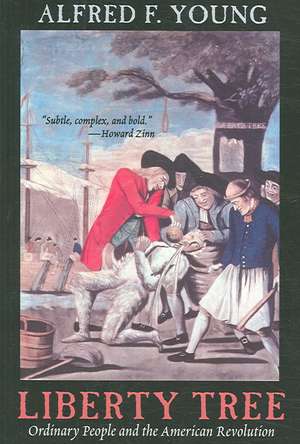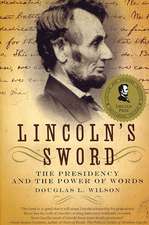Liberty Tree – Ordinary People and the American Revolution
Autor Alfred F. Youngen Limba Engleză Paperback – 5 noi 2006
| Toate formatele și edițiile | Preț | Express |
|---|---|---|
| Paperback (1) | 248.76 lei 43-57 zile | |
| MI – New York University – 5 noi 2006 | 248.76 lei 43-57 zile | |
| Hardback (1) | 531.93 lei 43-57 zile | |
| MI – New York University – 5 noi 2006 | 531.93 lei 43-57 zile |
Preț: 248.76 lei
Nou
Puncte Express: 373
Preț estimativ în valută:
47.60€ • 49.83$ • 39.39£
47.60€ • 49.83$ • 39.39£
Carte tipărită la comandă
Livrare economică 07-21 aprilie
Preluare comenzi: 021 569.72.76
Specificații
ISBN-13: 9780814796863
ISBN-10: 0814796869
Pagini: 420
Ilustrații: 18 illustrations
Dimensiuni: 185 x 228 x 28 mm
Greutate: 0.58 kg
Editura: MI – New York University
ISBN-10: 0814796869
Pagini: 420
Ilustrații: 18 illustrations
Dimensiuni: 185 x 228 x 28 mm
Greutate: 0.58 kg
Editura: MI – New York University
Recenzii
"The key point that shines through all these essays is how dependent our hallowed Founding heroes were on the shifting political alliances they had to form with citizens of lower economic status in order to provide the leadership we honor them for today."
Washington Times "This fascinating collection of essays makes a gripping display of the American historian's efforts to construct a more inclusive, nuanced vision of the Revolutionary War era. . . . A social historian committed to rounding out our cultural memory, Young includes traditionally marginalized groups (women, the poor, the working class, African Americans and Native Americans), but is interested neither in adding token representations nor in replacing the founding fathers. Rather, Young seeks to re-imagine the Revolutionary War era holistically, and what emerges is not only a first look at key but forgotten Revolutionary players, but also a fresh look at figures like Hamilton, Revere and Adams, portrayed here with a richness and humanity lacking in more celebratory treatments. Although these are serious academic essays, Young's prose is clear and concise, and he judiciously relegates the more technical, scholarly matters to end notes. The result is a work that will be of equal interest to professional scholars and amateur historians. "
Publishers Weekly "Young assists the construction of a fuller historical picture of the Revolutionary American era by focusing on the common peopleto gain a more complete understanding of the interplay between the political and social elite and these groups.Highly recommended."
Choice " [A] wonderfully enlightening and engaging book .[A]n invaluable resource for history teachers at all levels."
—The History Teacher "The authors stated objective is a more inclusive history that unites perspectives from the bottom up and the middle with those from the top down in order to illuminate the whole. He achieves that admirably while imparting a sense of extraordinariness to the contributions of his ordinary performers."
The North Carolina Historical Review "Young allows us a fascinating glimpse of what the long revolutionary period was like for all levels of colonial society. The book, a collection of essays written over a twenty-year period manages to make even the familiar new and interesting."
International Socialist Review"[A] provocative collection of essays.
Boston Globe"The key point that shines through all these essays is how dependent our hallowed Founding heroes were on the shifting political alliances they had to form with citizens of lower economic status in order to provide the leadership we honor them for today. . . . It is small wonder that the debate over whether government should be responsive to, or rather wary of, the mass of ordinary citizens remains central to American politics to this day. This book is a valuable tool for understanding that debate."
Washington Times "To read these eloquent essays by one of the wisest historians of our time is to be drawn into a remarkable conversation: practical, eloquent, decent, and shrewd. Behind Alfred Young's mesmerizing prose lies dazzling detective work that finds courageous people in all the fullness of their lives, who made a revolution as surely as did more famous leaders. Within the lively stories he tells is also a sharp skepticism of the ways that, over the years, tales of the Revolution have been spun to serve selfish political needs. And throughout Al Young's interpretations there sings a humane vision for our future, as readers of history, as tourists, and as citizens."
Linda K. Kerber, author of No Constitutional Right to Be Ladies: Women and the Obligations of Citizenship "Drawing on his unsurpassed knowledge of the American Revolution, and his powerful commitment to the idea of 'history from below,' Alfred Young gives us a stirring reminder of the role of 'the people' in the Revolution. He challenges the orthodox emphasis on the 'great men' of that time, and with vivid specificity provides an analysis which is subtle, complex, and bold."
Howard Zinn, Professor Emeritus, Boston University and author, A People's History of the United States "In these finely honed essays, Alfred Young brings together more than a half-century of scholarship on the revolutionary era. America's E. P. Thompson, Young has done more than any other historian of his generation to give ordinary people their due as historical actors of consequence. Deep scholarship, lucid writing, and a high-spirited sympathy for the people 'out of doors' are the hallmarks of this massive contribution to our understanding of Revolutionary America. "
Gary B. Nash, author of The Unknown American Revolution: The Unruly Birth of Democracy and the Struggle to Create America
Washington Times "This fascinating collection of essays makes a gripping display of the American historian's efforts to construct a more inclusive, nuanced vision of the Revolutionary War era. . . . A social historian committed to rounding out our cultural memory, Young includes traditionally marginalized groups (women, the poor, the working class, African Americans and Native Americans), but is interested neither in adding token representations nor in replacing the founding fathers. Rather, Young seeks to re-imagine the Revolutionary War era holistically, and what emerges is not only a first look at key but forgotten Revolutionary players, but also a fresh look at figures like Hamilton, Revere and Adams, portrayed here with a richness and humanity lacking in more celebratory treatments. Although these are serious academic essays, Young's prose is clear and concise, and he judiciously relegates the more technical, scholarly matters to end notes. The result is a work that will be of equal interest to professional scholars and amateur historians. "
Publishers Weekly "Young assists the construction of a fuller historical picture of the Revolutionary American era by focusing on the common peopleto gain a more complete understanding of the interplay between the political and social elite and these groups.Highly recommended."
Choice " [A] wonderfully enlightening and engaging book .[A]n invaluable resource for history teachers at all levels."
—The History Teacher "The authors stated objective is a more inclusive history that unites perspectives from the bottom up and the middle with those from the top down in order to illuminate the whole. He achieves that admirably while imparting a sense of extraordinariness to the contributions of his ordinary performers."
The North Carolina Historical Review "Young allows us a fascinating glimpse of what the long revolutionary period was like for all levels of colonial society. The book, a collection of essays written over a twenty-year period manages to make even the familiar new and interesting."
International Socialist Review"[A] provocative collection of essays.
Boston Globe"The key point that shines through all these essays is how dependent our hallowed Founding heroes were on the shifting political alliances they had to form with citizens of lower economic status in order to provide the leadership we honor them for today. . . . It is small wonder that the debate over whether government should be responsive to, or rather wary of, the mass of ordinary citizens remains central to American politics to this day. This book is a valuable tool for understanding that debate."
Washington Times "To read these eloquent essays by one of the wisest historians of our time is to be drawn into a remarkable conversation: practical, eloquent, decent, and shrewd. Behind Alfred Young's mesmerizing prose lies dazzling detective work that finds courageous people in all the fullness of their lives, who made a revolution as surely as did more famous leaders. Within the lively stories he tells is also a sharp skepticism of the ways that, over the years, tales of the Revolution have been spun to serve selfish political needs. And throughout Al Young's interpretations there sings a humane vision for our future, as readers of history, as tourists, and as citizens."
Linda K. Kerber, author of No Constitutional Right to Be Ladies: Women and the Obligations of Citizenship "Drawing on his unsurpassed knowledge of the American Revolution, and his powerful commitment to the idea of 'history from below,' Alfred Young gives us a stirring reminder of the role of 'the people' in the Revolution. He challenges the orthodox emphasis on the 'great men' of that time, and with vivid specificity provides an analysis which is subtle, complex, and bold."
Howard Zinn, Professor Emeritus, Boston University and author, A People's History of the United States "In these finely honed essays, Alfred Young brings together more than a half-century of scholarship on the revolutionary era. America's E. P. Thompson, Young has done more than any other historian of his generation to give ordinary people their due as historical actors of consequence. Deep scholarship, lucid writing, and a high-spirited sympathy for the people 'out of doors' are the hallmarks of this massive contribution to our understanding of Revolutionary America. "
Gary B. Nash, author of The Unknown American Revolution: The Unruly Birth of Democracy and the Struggle to Create America
Notă biografică
Alfred F. Young













